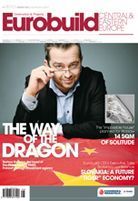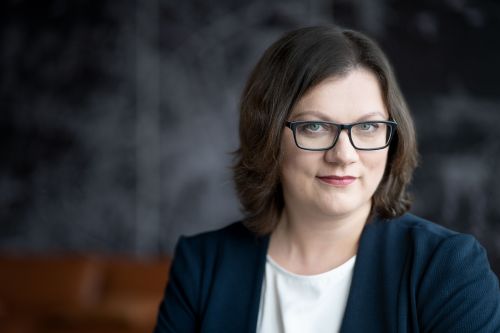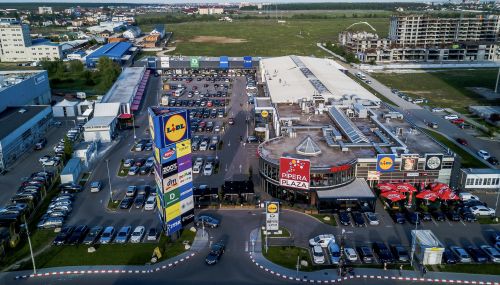The way of the dragon
FeatureWhen I started to work here six years ago there was one delegation from China a month - now there are two or three every week," says Bartosz Komasa, the head of the China desk at the Polish Information and Foreign Investment Agency (PAIiIZ). The delegates he is meeting - usually representatives of Chinese central and local government and local companies - have revealed to him that there is a Chinese national strategy to focus investment on Poland and Greece. The latter, because at the moment it is cheap to buy there, and Poland for its strategic location in the EU. "The Covec affair has complicated this process somewhat," he admits, "but this doesn't seem to have put off other potential companies and we don't see any problems with future investment."
Some in the Polish media, however, are less sanguine about the prospect of more Chinese constructors coming our way. On June 15th the country's General Directorate for National Roads and Highways (GDDKiA) tore up its contract with the China Overseas Engineering Group (Covec) for the construction of two sections of the A2 motorway - a decision that has now been upheld after a subsequent appeal. The cancellation of the contract came after the Chinese had failed to pay their subcontractors and came back to the negotiating table to beg for more money. The Polish media then went into something of a frenzy, publishing further evidence of what they saw as the unsuitability of the company for such a project. 'Dziennik Gazeta Prawna' revealed that the Fijian government had commissioned Covec to build a motorway by 2005, but the work was only 35 pct complete in 2006 after five years on the job. Fiji eventually cancelled the contract and lost USD 34 mln. The publication of such revelations has led people to wonder whether this is the last time that the Polish government entrusts a Chinese firm with a major project.
Global ambitions
But despite the fallout from the Covec affair, China has long-term ambitions for establishing itself as major player in EU markets. According to Mr Komasa:
"For a few years China has had a 'go-global' policy aimed at conquering foreign markets. Their first targets were in Asia, such as Malaysia and Indonesia. But the second stage of this plan is to invest in Europe. Poland could act as a bridge into EU markets. It has the advantage of cheaper costs than Western Europe, but has the same EU labour laws and other regulations. So the Chinese can come here to enjoy the lower costs while learning about EU labour law in the process." He adds that China had recently been heavily involved in North Africa, where it lost a lot of contracts after the region erupted. "Now they are tending to prefer more stable, democratic countries, such as Poland and the EU. The projects are not as big as those they had in North Africa, but they are safer."
The Chinese themselves have few doubts regarding their own abilities and are clearly eager to start investing heavily throughout the CEE region. Recently there has been a series of state visits across Europe by Chinese trade delegations, resulting in the signing of major investment deals with the region's governments. One of the big attractions of inviting Chinese firms to take on projects is that they are often backed up by Chinese banks at a time when finance is thin on the ground for Western firms at the moment. A large Chinese bank, such as the Export Import Bank of China, can grant large 'preferential buyers loans' for infrastructure projects - but on condition that Chinese companies are awarded the contracts.
Sweet and sour goulash
At the moment Chinese officials are visiting Hungary with a view to providing a EUR 1 bln loan for such projects. The twelve bilateral agreements already signed by the Chinese foreign minister Yang Jiechi and the Hungarian minister of national development Tamás Fellegi include memorandums of understanding for air and river transport projects; and another for rail projects has been signed by Chinese minister of commerce Chen Deming. Two of the projects being considered are for an airport and a high-speed rail link. A new cargo airport could be built in Szombathely by the Shanghai Construction Group at a cost of HUF 100 bln (app. EUR 168 mln). The proposed 4,000m runway would be the longest in the region. However, Tamás Matura of the Hungarian Institute of International Affairs, who was an observer at the meetings of the Chinese delegation with Hungarian officials, has doubts over the feasibility of these projects. "The problem with this type of investment is that the private company has only 20 pct of the capital. It wants to ask the Chinese and Hungarian governments to provide the other 80 pct. Maybe this funding would only be in the form of guarantees, but it's a huge investment, even for the Chinese I believe." An alternative, though a much more modest project, would be to modernise and refit the military airfield at Taszár, converting it into a civilian airport. MÁV (the Hungarian Railways)has also been negotiating with the Chinese to discuss a high-speed link between Budapest and Budapest Airport. Another Hungarian project worth mentioning is the proposed Huawei logistics centre, from where Huawei, a telecommunications equipment supplier, is planning to supply products to the European market. Again Mr Matura is sceptical. "We have to face the fact that markets like the UK and France are far larger than Hungary. The entry points for the EU remain Rotterdam and the other major ports in Western Europe. We would like to become a hub, but the only possibility is to become a hub for Central Europe. However, we also have to face competition from others. For China it's not reasonable to have one and only one centre. It's much more sensible to have several small centres across the region."
On July 11th the Serbian government also signed a number of bilateral agreements with the Chinese, strengthening their mutual relations and preparing the way for Chinese companies to enter the market. One project in the country, which is being carried out by the Chinese Road & Bridge Corporation (CRBC), is to build the 'Friendship bridge' joining the Borca and the Zemun districts of Belgrade. The project, which includes both the bridge and connecting roads is to cost EUR 170 mln, with EUR 70 mln set aside to build the bridge alone. (CRBC and Belgrade city council refused to give us any further details on this project). The Serbian government has borrowed EUR 1 bln from the Chinese and is anxious to use the money on its chosen projects. Elsewhere in the Balkans negotiations are taking place with Chinese officials to build a new terminal for Zagreb airport, which is expected to cost EUR 280 mln. Also worth mentioning is China Town Romania's EUR 150 mln mixed-use project in Afumaţi outside Bucharest, the first phase of which (138,500 sqm of retail) has just been opened. Warehousing and residential areas are also planned for the complex.
Pearly-eyed in Petersburg
In Russia, on the other hand, where real estate and construction projects often seem to be on a much bigger scale than elsewhere in the region, the same appears to be true when it comes to Chinese investment. Baltic Pearl in St Petersburg is a massive project by the Shanghai Overseas United Investment Holding - a joint venture between five separate Chinese firms including the Shanghai Industrial Investment Company (SIIC), the Shanghai Brilliance Group, Jinjiang International, the Shanghai Greenland Group and the 'Eurasia' Shanghai Industrial Development Center. The total investment comes to EUR 1.3 bln. The finished mixed-use complex would in effect be a new city district covering an area of almost 2 sq km, with homes for 35,000 residents.
Unfortunately ZAO Baltic Pearl, the management company for the complex, was also unwilling to grant us an interview. Finnish developer SRV, however, which was brought in by the Chinese to build the Pearl Plaza shopping and entertainment centre, turned out to be far more talkative. Work has already begun on the mall, which is 50 pct owned by SRV and 50 pct by SIIC. The first phase of the centre will have a gross building area of app. 93,000 sqm with app. 45,500 sqm gla. When asked whether there were any cultural problems during the negotiations, Jukka Kähärä, project director of SRV Russia, stated simply, "surprisingly, no." He explained that his company had gone to great lengths to learn about Chinese culture and avoid making simple gaffes. "The Finnish way of negotiating is very direct, but with the Chinese it's not always so straightforward. You have to look at things in many different ways. And we have been very successful. Our negotiations have been very frank and that has been good for us. The persons who were negotiating had full authority. We were lucky to have the people who could make the decisions in the room," explained Mr Kähärä. When SRV first joined the project, the Chinese investor had already built the first residential blocks.
"It was in the summer of 2009, if I remember correctly," recalled Mr Kähärä. "They came to us and they introduced the project. In our case, they were looking for a professional developer and possibly co-investor, both of which roles suited us. The Chinese company had been preparing the project for about two years. And they had learnt that the way they do things in China does not necessarily work in Russia - especially in the retail sector. They had managed the residential side very well and built offices, but there was no retail development."
Getting things in perspective
Bartosz Komasa of PAIiIZ also relates one experience of a Chinese firm seeming not to know their way around the retail sector in the region: "One company we spoke to was looking for 150 ha in the centre of Warsaw for a large shopping centre project with hotel and entertainment facilities. They didn't understand the difference in scale and that such plots are virtually impossible to find in central Warsaw. And they thought that they would be able to buy land like this without a tender - simply because they didn't understand the local regulations. But having visited Poland they do know that we don't have enough hotels for Euro 2012."
Instead, it is when it comes to building residential projects that the Chinese seem to be much more at ease. One example is Yu Long Construction's Vis-a-Vis residential project in Kielce, Poland - an estate with five buildings and 111 apartments, which is partly owned by the Chinese and partly by Kielce city council. According to the president of the board, Zeng Xiaohu, the flats will be ready to be handed over to clients within a month. When asked about the differences between European and Asian culture, Mr Zeng commented: "One of the key problems for the Chinese is not only the different business culture but also the different social culture. Oriental methodology is quite different from that in the West. However, you cannot say which one is better." But Mr Zeng felt that few other Chinese developers would follow him to Europe. "This is not an easy business," he says. "Perhaps there will be more companies investing in Poland. Chinese construction companies are interested in coming to Europe. However, the A2 project has had a big negative impact on the perception of Chinese construction firms." So just how badly damaged has the reputation of Chinese constructors been by the A2 affair? For Covec the contract was an important one. It was their first tender to build a motorway in a European Union country and was seen at the time as the company's chance to enter the larger EU market. At the time, however, there were rumours of price dumping. Urszula Nelken, the spokesperson for the GDDKiA, admits that Covec submitted the lowest bid for the contract, but "it was not the only bid that was lower than the investor's estimate. The price criterion, once the bidder's competencies and experience has been checked, is the most objective." Indeed, it was the matter of finances that eventually resulted in Covec losing the contract. But the first sign of trouble appeared when subcontractors complained that they had not been paid. According to Covec, the problems were due to the GDDKiA paying its bills at the last possible moment, after a period of 58 days had elapsed. Covec, on the other hand was obligated to pay its suppliers and subcontractors after a period of only five days. Covec also complained that the GDDKiA's evaluation and supervision of its work was unfairly biased and that building materials had also unexpectedly jumped in price. Covec went back into negotiations and asked for the value of its contract to be increased, at which point the GDDKiA refused. In 2009, 'Eurobuild CEE' interviewed the vice-president of Covec in charge of operations in Poland and Eastern Europe, Zhao Xiang, who stated: "It seems to be common for European companies to re-negotiate the terms of their contracts. At the end of the day the final price turns out to be higher. The Chinese code of business conduct, however, says 'Stick to the price you have promised.'" At the same time, when Covec was being thrown off the A2 motorway, the company was also having problems with its contract to build the Gromada hotel in Kraków. After a series of delays the building is still not finished. After cracks appeared in the flooring, Covec stated that the cause was because it had not been supplied with the correct technical drawings and that the fault had been corrected at its own expense. Then, when the roof leaked, Covec blamed it on the firm that had installed the air conditioning.
Send for the professionals
"In the case of Covec, as with some other Chinese companies entering the market, there has been a lack of professionalism," claims Bartosz Komasa. "If they'd employed a PR specialist to communicate with the media, as well as lawyers and advisors, they could have got through the whole affair much better. Now the impression of the general public is that Covec is totally to blame for the A2 fiasco. But I believe that some of the problems were due to the Polish side. It is also hard for them to get used to Western construction standards and equipment. The solution is always to have a Polish supervisor for each stage of the construction." However, the president of Covec, Fang Mingyuan, has now been dismissed and an audit of the company is to be carried out by the Chinese state-owned assets commission to investigate mismanagement, ignorance of European markets and under-bidding, while the GDDKiA is to ask for roughly CNY 1.75 bln (EUR 190 mln) in compensation and for all members of the Covec group to be banned from participation in any future Polish public tenders for the next three years.
When it comes to the accusation made against Covec of price dumping (which it categorically denies) it is not the only Chinese company in the region suspected of engaging in this dark practice. An anonymous source close to the deal told us that he doubted whether the 'Friendship' bridge in Belgrade could feasibly be built for only EUR 70 mln by CRBC and that the Chinese were quite clearly price dumping because the negotiations over the price were extraordinarily quick.
Bartosz Komasa, however, believes that the allegations of price dumping could also be due to a lack of professionalism when it comes to the public relations sides of Chinese companies. "Covec wanted to do the project as cheaply as possible but didn't want to take any advice. They wanted to establish themselves in the country, and to do so thought that they could offer a price for the A2 project with which they wouldn't make very much money but also wouldn't lose any. Polish advisors would have told them to offer a more realistic price.
So the situation arose due to not employing a local company to do their estimates. But the German and Italian bids in this tender were much too high, so I'm actually happy that Covec came along to show them that they could have done it much cheaper." Another example he provides of not taking local advice is that of a Chinese firm he knows of which, by including the wrong factors in their calculations, had estimated the construction costs for a building to be twice as much as a Polish firm had.
Why don't you talk to me?
Cultural differences do seem to pose an obstacle. As has been mentioned several times throughout this article, very few of the Chinese companies we attempted to contact showed any kind of willingness to talk to us. Covec for example didn't take up our offer to allow them to give their side of the story. Likewise, all but one of the Chinese developers we approached refused to take advantage of what could be vital exposure in the trade media, raising the profile of their companies and projects. - an attitude that seems downright bizarre to those used to the way things work in Western markets.
As Bartosz Komasa of PAIiIZ explains: "Chinese firms don't like to - or are not allowed - reveal information without the permission of the boss. So they tend to refrain from giving answers to any questions whatsoever - for instance, when it comes to revealing company financial data to banks. And this is one of the reasons why the EU doesn't regard China as a free-market economy, because in China the same obligations to reveal data as for Western firms do not exist." He goes on to explain that it is a different situation when there are Chinese managers who have worked here and are experienced in Western markets, and can often operate their companies very smoothly; but it often turns out that the manager may have little knowledge of the local environment. According to Mr Komasa, local firms in the region also have to take on board these differences in business culture if they want to co-operate with their Chinese counterparts. In China an initial business meeting is only a getting to know each other session. Local companies should know that maybe four or five such meetings are needed before they can get down to business with them, so they need to be very patient. "The Chinese have a long term approach - analysing everything, listing all the pros and cons," he says. "Their companies have a lot of structures, so the decision process is very complex and takes a long time. Polish partners complain about this, but this is the reality. For example, it took one Polish company 18 months just to make a money transfer to China." But this clash of civilisations is one that we are going to have to get used to as China's economic and financial power inexorably grows, as well as its expertise in fields such as construction and real estate. It might be too early to proclaim the entry of the dragon, but it is making its first tentative steps in the CEE region and has every intention of making its presence permanent.
Alexander Hayes, Nathan North





















































